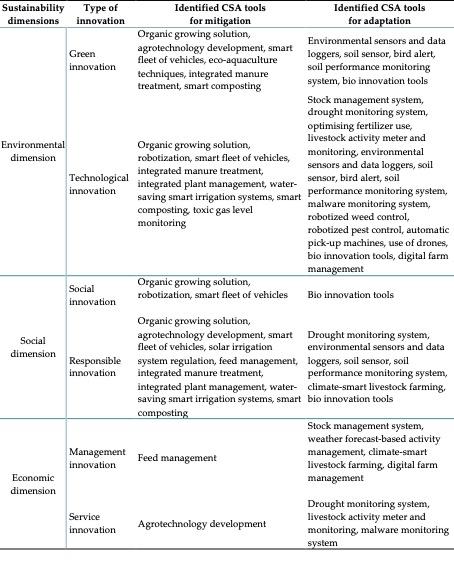|
|
BMe Research Grant |
|
Doctoral School of Business and Management
BME GTK, Department of Environmental Economics
Supervisor: Szalmáné Dr. Csete Mária
Climate innovation to achieve sustainability for businesses
Introducing the research area
My research focuses on companies’ ability to adapt to climate change. Hungarian agriculture is one of the driving forces behind the national economy, which must meet the growing production needs that have an impact on climate change and, as an integral part of the economy, must also contribute to reducing emissions. A key research question is how the sector can mitigate the expected effects of climate change without threatening food security. The research explores the experience and activities of Hungarian agribusinesses in relation to climate change and presents the Climate-Smart Agriculture (CSA) solutions and tools, thus providing an opportunity to gain experience about the topic of climate innovation. In the framework of the research, I identify the climate measures of agribusiness and establish an indicator-based sustainability assessment that compares adaptation performance and improves the sector's preparedness for the expected effects of climate change, thus reducing risks and sustainability monitoring may also become available. The development and application of the model conforms to the latest international trends, so it can be of outstanding importance for the creation of sustainable agricultural and rural development in Hungary.
Brief introduction of the research place
I conduct my research at the Department of Environmental Economics of the Budapest University of Technology and Economics, under the supervision of Mária Szalmáné Dr habil. Csete.
History and context of the research
Climate change is one of the most critical economic and social challenges of the 21st century, and its environmental unsustainability is confirmed by several documents (IPCC, 2014; IPCC 2018; WWF, 2011). The effects of climate change are most visible in economic processes that are closely linked to the environment, so they have a significant impact on agriculture. Hungary faces several challenges due to changing climatic conditions, so adaptation to climate change can also be interpreted as one of the critical points of long-term sustainability. Figure 1 describes the conceptual framework of my research, which basically focuses on meeting the most important challenges of our time in the field of agricultural and rural development. Sustainability and climate change are interlinked in many ways in the form of a circular relationship from a sectoral and regional point of view (Szalmáné, 2018).
Figure 1 Conceptual framework of Climate-Smart Agriculture (CSA). (Biró, Szalmáné Csete, 2021 – Gazdálkodás)

The key to combat climate change is to bring innovative solutions to the forefront of businesses and to effectively implement the related proposals. In my research, I sought the answer the following question: what could be the common denominator and evaluation criteria for examining the interrelationships of sustainability – climate change – digitization – innovation, which could be suitable for characterizing all four mentioned processes in the field of agricultural economy and rural development. I have concluded that climate-smart agriculture (CSA) can be a suitable solution for this.
The research goals, open questions
On the one hand, the research provides an insight into the complex relationship between Corporate Social Responsibility (CSR) and adaptation to climate change. Its novelty lies in linking corporate social responsibility with climate protection measures. The aim of the research is to explore the Climate-Smart Agriculture (CSA) solutions and tools that appear at Hungarian agribusinesses, creating an opportunity to raise awareness, better understand the climate innovation topic and transfer good practices, thus helping the sector to move towards sustainability. My hypothesis is that the use of CSA tools effectively supports sustainable agricultural and rural development goals. The research also aims to identify and typify the adaptation measures of agribusiness and I propose to develop an adaptation framework for all current and future measures along the sustainability indicators. Using the comparative indicator-based assessment, the socio-economic-environmental impacts of the introduced or even planned or proposed adaptation measures can be assessed and quantified along the sustainability impact indicators.
Methods
The research was based on an international publication summarizing the results of previous studies (Biró and Szalmáné Csete, 2021), which seeks to explore the role and opportunities of the Hungarian agricultural sector in adapting to climate change, furthermore, it examines the extent of the mitigation and adaptation activities appearing in the CSR portfolio of the companies and the specific measures taken to realize them. The database from my empirical research was based on a climate-structured content analysis of the websites of 137 companies and publicly available non-financial (sustainability) and corporate CSR reports. The links between corporate social responsibility and adaptation to climate change have also been examined from a sectoral and regional perspective.
In my research, I evaluated the climate innovation efforts of the agriculture sector and the CSA activity of agribusiness based on a quantitative and qualitative survey. As part of the quantitative study, I asked different actors in the agricultural sector about CSA, CSA tools and practices, and the factors that prevent their use. I conducted two questionnaire surveys: (1) at the organizational level among Hungarian agribusiness and (2) at the institutional level among the county directorates of the National Chamber of Agriculture (NAK). In the rest of the research, I narrowed my national sample to the Transdanubia planning-statistical region. Finally, the survey was completed by a semi-structured in-depth expert interview to explore the agricultural situation of the examined region, the risks of climate change, as well as the CSA tools used and the areas of improvement. I set up a comparative indicator-based assessment of the companies' climate protection measures. Along the indicators, I use a rethought Leopold matrix to compare firm-level adaptation performance at each agricultural firm. For mitigation objectives, the comparison of baseline and target values is of paramount importance, whereas for adaptation measures, results and impacts are the key areas.
Results
In the case of the selected company groups, I examined the mitigation and adaptation measures appearing in the companies' CSR portfolio, as well as the specific measures and strategic ideas used to implement them, and how they may be related to the company's effectiveness. Based on the results, the CSR consciousness of the companies is relatively underdeveloped but at the same time, companies are motivated to prepare for the expected effects of climate change by using adaptation strategies in addition to reducing emissions, so there is a visible potential and CSR is a viable tool to help companies adapt to climate change. In the case of the examined agricultural companies, adaptation techniques were classified according to the Dolan typology (Dolan, 2001). The climate-oriented level of CSR activities was evaluated in the Hungarian agribusiness based on content analyses that showed a diverse picture and moderate level of interest concerning adaptation options and potential. Among the examined top Hungarian companies, the level of financial and technology-oriented adaptation tools and activities was found low. Climate-oriented CSR activities in agribusiness can play a pivotal role in fostering the practical implementation and the steps towards sustainable agriculture in Hungary (Biró and Szalmáné Csete, 2021). Next, using a questionnaire survey conducted among agribusiness, I compiled the agri-innovation portfolio of companies, which systematizes agri-innovation solutions based on the three dimensions of sustainability.
|
Table 1. Sustainability perspective of identified CSA tools |
 |
The results show that incorporating a climate-oriented approach into business planning strategies can increase farm productivity and digital transition in a sustainable way, while reducing greenhouse gas emissions and the sector’s vulnerability to climate change. There is an enormous potential for developing CSA tools to create sustainable agriculture, as it can support not only EU climate policy goals but also national recovery and resilience building plans, in line with green economic development goals and the digital transition. In the Transdanubia region, 12 CSA tools have been identified, which strengthen the environmental dimension of sustainability the most, and the economic pillar of sustainability can be considered a deficit area. My research confirmed that farmers in the study area are susceptible to agri-innovation, but only partially exploit the potential of digitalisation, especially in the case of climate innovation solutions, as they do not have sufficient experience and practical knowledge in the implementation and operation of the innovation tool. For domestic agriculture, the spread of agricultural digitalisation and technology transfer is an excellent opportunity to increase agricultural production, maintain and improve its market position, and increase its digital maturity, which also supports the integration of climate innovation and sustainability aspects.
Expected impact and further research
In my research, during the sectoral study of climate innovation goals, I attempted to map and evaluate the domestic situation of CSA, which – based on the international and domestic literature analyses – is a novel study. The developed portfolio is a generally applicable model for evaluating the CSA activity of agribusiness, which can contribute to the transfer of good practices and the promotion of agri-innovation activities of farmers, thus supporting the achievement of common policy objectives. The indicator-based assessment system will help improve adaptation to the expected effects of climate change, minimize risks, and enable the monitoring of adaptation of business processes, thus reducing the sector's vulnerability to climate change. The developed methodology is expected to be adaptable to other sectors. I would like to integrate my results into the mandatory Hungarian and English language courses of the master’s program in Regional and Environmental Economics of the Department of Environmental Economics and utilize them in the curriculum development of the courses. The future direction of the research includes extending and generalizing the applied methodology to other sectors (e.g., the transport sector) and applying an efficiency study to the evaluation of corporate climate innovation activity.
Publications, references, links
List of corresponding own publications:
https://m2.mtmt.hu/gui2/?type=authors&mode=browse&sel=10060751
All scientific publications: 22; Independent citations: 87; Hirsch-index: 2;
Biró, Kinga; Szalmáné Csete Mária (2021): A klímainnovációs törekvések vizsgálata a dunántúli tervezési-statisztikai régiókban. In: GAZDÁLKODÁS 65. pp. 375-396, 22 p. (2021)
Biró, K., Szalmáné Csete, M. (2021): Corporate social responsibility in agribusiness: climate-related empirical findings from Hungary. Environ Dev Sustain 23, 5674–5694 (2021). https://doi.org/10.1007/s10668-020-00838-3
Szalmáné Csete, Mária; Biró, Kinga (2020): Vállalati megfelelőség a klímaváltozás korában, In: Duleba, Szabolcs (szerk.) Logisztikai Évkönyv 2021. Budapest, Magyarország: Magyar Logisztikai Egyesület (2020) p. 39
DOI ISSN: 1218-3849
Biró, Kinga (2020): A vállalatok klímavédelmi törekvései a regionális versenyképesség tükrében, In: Kutasi, Gábor; Czeczeli, Vivien; Marton, Ádám (szerk.) Economic Challenges in 2020s: RICE PhD Seminar: Proceeding of Abstracts, Budapest, Magyarország: Nemzeti Közszolgálati Egyetem (2020) p. 15
Biró, Kinga; Szalmáné Csete, Mária (2019): Evaluation of Climate Change Related CSR Activities in the Hungarian Agribusiness. In: Borg, Ruben Paul; Spiteri Staines, Cyril (szerk.) SBE 19 Malta Sustainability & Resilience, La Valletta, Málta: SBE Malta - Sustainable Built Environment Malta, (2019) p. 148
Kinga, Biró (2019): Corporate strategies for climate protection.In: Bálint, Horváth; András, Borbély; Eszter, Fodor-Borsos; Péter, Földi; Amelita, Kata Gódor; Zsombor, Kápolnai (szerk.) V. Winter Conference of Economics PhD Students And Researchers: Book of Abstracts. Gödöllő, Magyarország: Doktoranduszok Országos Szövetsége (DOSZ) (2019) 138 p. p. 27, 1 p.
